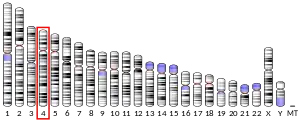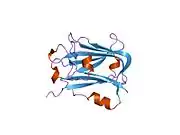ANAPC10
Anaphase-promoting complex subunit 10 is an enzyme that in humans is encoded by the ANAPC10 gene.[5][6][7]
| ANAPC10 | |||||||||||||||||||||||||||||||||||||||||||||||||||
|---|---|---|---|---|---|---|---|---|---|---|---|---|---|---|---|---|---|---|---|---|---|---|---|---|---|---|---|---|---|---|---|---|---|---|---|---|---|---|---|---|---|---|---|---|---|---|---|---|---|---|---|
 | |||||||||||||||||||||||||||||||||||||||||||||||||||
| |||||||||||||||||||||||||||||||||||||||||||||||||||
| Identifiers | |||||||||||||||||||||||||||||||||||||||||||||||||||
| Aliases | ANAPC10, APC10, DOC1, anaphase promoting complex subunit 10 | ||||||||||||||||||||||||||||||||||||||||||||||||||
| External IDs | OMIM: 613745 MGI: 1916249 HomoloGene: 32238 GeneCards: ANAPC10 | ||||||||||||||||||||||||||||||||||||||||||||||||||
| |||||||||||||||||||||||||||||||||||||||||||||||||||
| |||||||||||||||||||||||||||||||||||||||||||||||||||
| |||||||||||||||||||||||||||||||||||||||||||||||||||
| |||||||||||||||||||||||||||||||||||||||||||||||||||
| |||||||||||||||||||||||||||||||||||||||||||||||||||
| Wikidata | |||||||||||||||||||||||||||||||||||||||||||||||||||
| |||||||||||||||||||||||||||||||||||||||||||||||||||
Interactions
ANAPC10 has been shown to interact with CDC27,[8][9] Mothers against decapentaplegic homolog 3[10] and Mothers against decapentaplegic homolog 2.[10]
References
- GRCh38: Ensembl release 89: ENSG00000164162 - Ensembl, May 2017
- GRCm38: Ensembl release 89: ENSMUSG00000036977 - Ensembl, May 2017
- "Human PubMed Reference:". National Center for Biotechnology Information, U.S. National Library of Medicine.
- "Mouse PubMed Reference:". National Center for Biotechnology Information, U.S. National Library of Medicine.
- Grossberger R, Gieffers C, Zachariae W, Podtelejnikov AV, Schleiffer A, Nasmyth K, Mann M, Peters JM (May 1999). "Characterization of the DOC1/APC10 subunit of the yeast and the human anaphase-promoting complex". The Journal of Biological Chemistry. 274 (20): 14500–7. doi:10.1074/jbc.274.20.14500. PMID 10318877.
- Wiemann S, Weil B, Wellenreuther R, Gassenhuber J, Glassl S, Ansorge W, Böcher M, Blöcker H, Bauersachs S, Blum H, Lauber J, Düsterhöft A, Beyer A, Köhrer K, Strack N, Mewes HW, Ottenwälder B, Obermaier B, Tampe J, Heubner D, Wambutt R, Korn B, Klein M, Poustka A (March 2001). "Toward a catalog of human genes and proteins: sequencing and analysis of 500 novel complete protein coding human cDNAs". Genome Research. 11 (3): 422–35. doi:10.1101/gr.GR1547R. PMC 311072. PMID 11230166.
- "Entrez Gene: ANAPC10 anaphase promoting complex subunit 10".
- Vodermaier HC, Gieffers C, Maurer-Stroh S, Eisenhaber F, Peters JM (September 2003). "TPR subunits of the anaphase-promoting complex mediate binding to the activator protein CDH1". Current Biology. 13 (17): 1459–68. doi:10.1016/S0960-9822(03)00581-5. PMID 12956947. S2CID 5942532.
- Gmachl M, Gieffers C, Podtelejnikov AV, Mann M, Peters JM (August 2000). "The RING-H2 finger protein APC11 and the E2 enzyme UBC4 are sufficient to ubiquitinate substrates of the anaphase-promoting complex". Proceedings of the National Academy of Sciences of the United States of America. 97 (16): 8973–8. Bibcode:2000PNAS...97.8973G. doi:10.1073/pnas.97.16.8973. PMC 16806. PMID 10922056.
- Nourry C, Maksumova L, Pang M, Liu X, Wang T (May 2004). "Direct interaction between Smad3, APC10, CDH1 and HEF1 in proteasomal degradation of HEF1". BMC Cell Biology. 5: 20. doi:10.1186/1471-2121-5-20. PMC 420458. PMID 15144564.
Further reading
- Kurasawa Y, Todokoro K (September 1999). "Identification of human APC10/Doc1 as a subunit of anaphase promoting complex". Oncogene. 18 (37): 5131–7. doi:10.1038/sj.onc.1203133. PMID 10498862.
- Gotthardt M, Trommsdorff M, Nevitt MF, Shelton J, Richardson JA, Stockinger W, Nimpf J, Herz J (August 2000). "Interactions of the low density lipoprotein receptor gene family with cytosolic adaptor and scaffold proteins suggest diverse biological functions in cellular communication and signal transduction". The Journal of Biological Chemistry. 275 (33): 25616–24. doi:10.1074/jbc.M000955200. PMID 10827173.
- Gmachl M, Gieffers C, Podtelejnikov AV, Mann M, Peters JM (August 2000). "The RING-H2 finger protein APC11 and the E2 enzyme UBC4 are sufficient to ubiquitinate substrates of the anaphase-promoting complex". Proceedings of the National Academy of Sciences of the United States of America. 97 (16): 8973–8. Bibcode:2000PNAS...97.8973G. doi:10.1073/pnas.97.16.8973. PMC 16806. PMID 10922056.
- Wendt KS, Vodermaier HC, Jacob U, Gieffers C, Gmachl M, Peters JM, Huber R, Sondermann P (September 2001). "Crystal structure of the APC10/DOC1 subunit of the human anaphase-promoting complex". Nature Structural Biology. 8 (9): 784–8. doi:10.1038/nsb0901-784. PMID 11524682. S2CID 27021761.
- Vodermaier HC, Gieffers C, Maurer-Stroh S, Eisenhaber F, Peters JM (September 2003). "TPR subunits of the anaphase-promoting complex mediate binding to the activator protein CDH1". Current Biology. 13 (17): 1459–68. doi:10.1016/S0960-9822(03)00581-5. PMID 12956947. S2CID 5942532.
- Nourry C, Maksumova L, Pang M, Liu X, Wang T (May 2004). "Direct interaction between Smad3, APC10, CDH1 and HEF1 in proteasomal degradation of HEF1". BMC Cell Biology. 5: 20. doi:10.1186/1471-2121-5-20. PMC 420458. PMID 15144564.
- Rual JF, Venkatesan K, Hao T, Hirozane-Kishikawa T, Dricot A, Li N, Berriz GF, Gibbons FD, Dreze M, Ayivi-Guedehoussou N, Klitgord N, Simon C, Boxem M, Milstein S, Rosenberg J, Goldberg DS, Zhang LV, Wong SL, Franklin G, Li S, Albala JS, Lim J, Fraughton C, Llamosas E, Cevik S, Bex C, Lamesch P, Sikorski RS, Vandenhaute J, Zoghbi HY, Smolyar A, Bosak S, Sequerra R, Doucette-Stamm L, Cusick ME, Hill DE, Roth FP, Vidal M (October 2005). "Towards a proteome-scale map of the human protein-protein interaction network". Nature. 437 (7062): 1173–8. Bibcode:2005Natur.437.1173R. doi:10.1038/nature04209. PMID 16189514. S2CID 4427026.
External links
- ANAPC10 human gene location in the UCSC Genome Browser.
- ANAPC10 human gene details in the UCSC Genome Browser.
This article is issued from Wikipedia. The text is licensed under Creative Commons - Attribution - Sharealike. Additional terms may apply for the media files.





